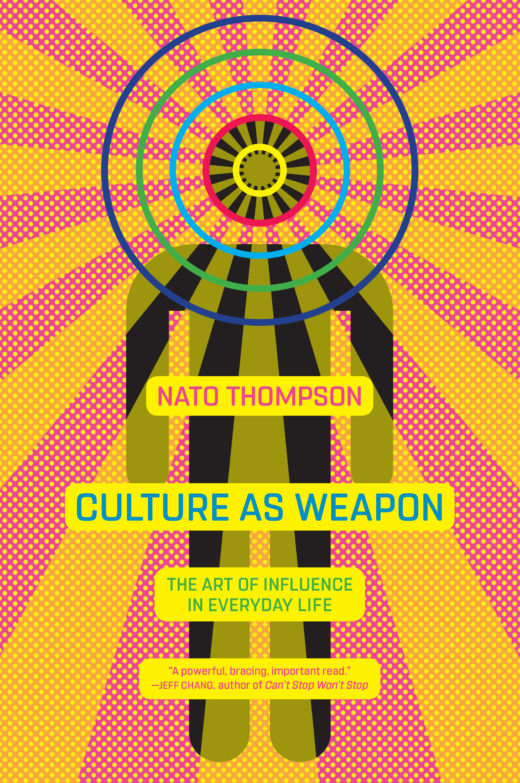- WHERE THE LITTLE POT SITS: A Search for Truth in Florida

- MIRROR STAGES: Brookhart Jonquil in Conversation
Culture as Weapon: The Art of Influence in Everyday Life by Nato Thompson
Chauncey Mabe

Since first merging onto the Information Highway, I have harbored doubts as to whether scholarship could long survive the digital age. Google makes it so, so easy to skim the surface of a given subject, lighting here for this weighty quote, there for that purloined insight. Who could say whether a work is the product of learned study or an afternoon on the Internet?
The answer turns out to be: Anyone capable of telling the difference between a lake and a puddle. In my hand I hold what may be the apotheosis of—let’s call it the “hypertext nonfiction book.” Culture as Weapon: The Art of Influence in Everyday Life, is sincere. Its author, Nato Thompson, wants to alert readers to the methods by which moneyed interests use culture to keep them ever more tightly harnessed to the consumer economy.
Alas, this well-meaning book lacks the attributes that make for meaningful social criticism: scholarship, research, reporting, intellectual depth, original thought, critical insight, and coherent prose. It feels akin, in fact, to what once was called a “clip job,” back in the day when hacks pawed through published clippings in lieu of doing their own legwork.
Culture as Weapon, however, bears the hallmarks of a book that could not have been written before the advent of Google. In addition to the telltale shallow research, its prose is not that of a book but a blog. The pages teem with the language of escalation and mock drama. Everything is “a range” from this thing to that possibly related thing, and all the things in between. Lists of items, separated by serial commas, masquerade as evidence. Everything is “vast,” or, if not vast, then “massive.”
This is writing produced by hypertext research, quickly done. It is tempting to indict the editing, too. Misused and misspelled words emerge from the mud like spring peepers. “Bilabo” for “Bilbao.” “Palatable” when “palpable” is meant, “cap” for “gap”—and in the same horror-show of a sentence: “In these places, many more cities suffering from the loss of manufacturing jobs, the wage cap between those working at good salaries and those stuck behind were palatable at every level.”
With such writing, it is little surprise that almost nothing new can be found here. Thompson rounds up the usual suspects, beginning with the culture war of the 1980s, when conservatives and preachers went after progressive (and transgressive) artists. He tells the familiar story of the development of modern PR and advertising (Edward Bernays, George Gallup, David Ogilvy, and the rest of that crowd). He surveys the ways the military-industrial complex uses fear, developers use gentrification. He writes of the appropriation of charity by corporate PR as though no one else has ever noticed.
Even so, Thompson at least might have provided a primer on the strategies of corporate social control. That, however, would require a modicum of clarity. “And if politicians and their constituents were eager to yell and gawk, the news media was thrilled to fan the flames.” You search in vain for any morsel of thought, prose style, or real content in that sentence. It is a collection of idioms and clichés and familiar phrases strung together to approximate meaning while obscuring the poverty of thinking that animates it.
Entire passages go by like this. No amount of editing can salvage a text in which the flaws are baked into the fibers of its composition. The very use of the word “weapon” in the title is wrong. “As a global strategy deployed at every level, culture has become a profound, and ubiquitous, weapon.” A weapon? Really? How many people has Mark Zuckerberg killed, how many have been massacred at the local Apple Store, how many mown down by Starbucks repurposing the Italian coffee shop?
In fairness, Thompson does uncover the occasional nugget. He notes that what really came out of the culture war was not so much a conservative victory as simply much more culture. He also singles out the novelist William S. Burroughs for a media prescience so acute, that his assessments of 50 years ago could easily be applied to today.
These insights come too seldom to redeem the book’s manifold flaws. Who knew the lazy-mindedness engendered by digital ease of use would extend so far, so fast?
Chauncey Mabe is a freelance writer based in Miami. For more than 20 years, he served as book reviewer for the Sun Sentinel newspaper in Fort Lauderdale. His work has appeared in the Miami Herald, the Toronto Globe & Mail, SUCCESS Magazine, the Palm Beach Arts Paper, and the Chicago Tribune.








